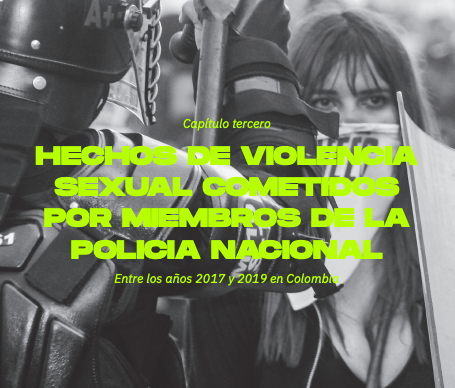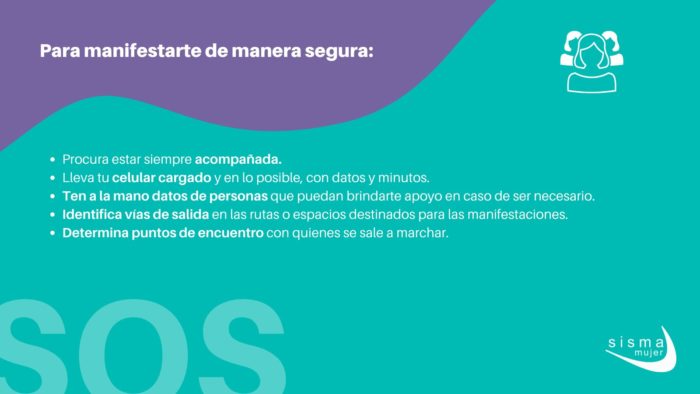Violence has erupted on the streets of many cities in Colombia in response to increasing poverty and inequality. What began as a national strike on 28 April in protest against tax reforms, escalated as police responded with oppression and brutality. Colombian NGO Temblores report that 37 people have been killed, 963 have been arbitrarily detained and 348 disappeared. Young women have been particular targets: Temblores report 12 cases of sexual violence committed by Armed Forces — all against women.
Social media a critical weapon to denounce violence against women
Social media has been widely used to publicise accounts of human rights abuses during the national strike and the subsequent demonstrations, which have continued, despite the fact the tax reform was withdrawn from Congress and finance minister, Alberto Carrasquilla, resigned. Protesters remain in the streets to denounce police violence, as well as the murders of dozens of social and environmental leaders, the social crisis in Buenaventura and a crumbling economy that has all but collapsed under the mishandled pandemic, in which over 75,000 people have died.
Temblores has managed to collect testimonies of human rights abuses through social media, media outlets and direct reports made to their platform for denouncing police violence, GRITA. The NGO have identified harassment and sexual abuse across cities including Cali, Bogotá, Acacías and Palmira. Most of the abuses are reported to have happened after dark and in police stations.
12 cases of sexual abuse
In one of these cases – caught on video – an officer from the anti-riot police force known as ESMAD (Escuadrón Móvil Antidisturbios), told one of his colleagues who was talking to a woman protester, to ‘Let her pass then do what you want to her’. The video was captured on Sunday, 2 May in Acacías, Meta, as a group of women protesters attempted to cross a street where ESMAD officers were stood.
One Twitter user shared the video, stating, ‘We women run a double risk when we’re detained by the Colombian Police Force. On top of torture, we could be victims of rape.’
Regarding the violent comment, Lina Porras, a police violence investigator from Temblores, explained to El Espectador: ‘This is an expression of sexual violence. It shows that women’s bodies are considered as territory on which to inscribe power and exercise authority; they’re considered as objects to possess and abuse. This ‘Do what you want to her’ means: ‘I have all the power, the authority to do whatever I want with your body.”
One woman tweeted that while she was walking home alone from Plaza de la Hoja in Bogotá, she was sexually harassed by police officers. ‘Some officers circled me, catcalling and using obscenities and said, ‘If this is what protesters are like, I love gassing them”. The victim went on to say, ‘You don’t know how scared I was, thinking I wasn’t going to make it home.’
Over social media, the Police Chief, Jorge Luis Vargas, stated: ‘The police force guarantees accompaniment in public protests and respects human rights in all of its procedures. We are backed by control entities and will verify information that’s circulating on social media about presumed victims as the days develop.’
However, numerous reports on social media have denounced the detention and sexual abuse of women protesters and the excessive use of force by members of the Armed Forces, particularly in Bogotá and Cali.
One account attests protestors were detained in a police station in Bogotá, where a woman was forced by an officer to undress. In another, women arbitrarily detained by Armed Forces in Tintal, Bogotá, threw themselves out of a vehicle in order to get away from officers who abused them inside of a police vehicle.
In Cali, a woman attests she was abused by an officer in the middle of a protest, in front of all of his colleagues, including a woman. Another woman attests she was retained and sexually harassed in custody.
The People’s Communication Agency have also reported grave human rights violations against protesters on the Cali-Palmira highway. The Cali city councillor Ana Erazo explained to El Espectador that ESMAD officers broke into the protests by force on the Paso del Comercio road and that various women were left trapped in the bushes, where they were abused.
A grave institutional issue
The shocking violence shown by the Armed Forces in recent days is seen as a continuation of their brutal behaviour during previous protests — notably in November 2019, when 18-year-old Dilan Cruz was murdered by police, and in October 2020, when protesters decried Javier Ordóñez death while in police custody. Three women were killed by ESMAD in the October 2020 protests: Marcela Zúñiga, Angie Paola Baquero and Julieth Ramírez Meza — who was only 18 years old.
Between 2017 and 2019 alone, there were 241 cases of sexual violence committed by members of the Armed Forces in reaction to demonstrations, according to data supplied by Medicina Legal for Temblores’ ‘Bolillo, Dios y Patria’ (Wallet, God and Fatherland) report.
This is not to mention year-round abusive behaviour from public forces. Since 2014, 288 police officers and soldiers have been investigated for sexually abusing minors, including the rape of a 12-year-old Embera Chami girl in Risaralda by seven members of the Army in June last year.

According to the above report, most of the victims of sexual abuse by Armed Forces are women, and aggressions disproportionately take place inside homes, police stations and detention centres. ‘For women, a run-in with a police officer always signifies a potential violation’, Temblores states.
The investigation underlines that numbers are likely to be much higher as there is underreporting, due to ‘a silence that exists around sexual violence’, which is socially and culturally normalised in Colombia. The report concludes that ‘Very often when victims are blamed, institutions respond with stigmatisation and revictimisation. Or they simply don’t register the reports if there isn’t physical proof. And access to justice is extremely curtailed’.
Grassroots support
Individuals, as well groups like Red Nacional de Mujeres and Universidad Nacional de Colombia, are sharing information on how women should best protect themselves from sexual abuse during the demonstrations.
Feminist Organisation Sisma Mujer advised: ‘Try to make sure you’re never alone; try to keep your phone charged, and topped up with credit and data where possible; write down emergency contact numbers and keep them on you; always look for escape routes; agree on meeting points with the people you’re going out with’.

They have also shared Covid-related suggestions as well as tips on looking after yourself at home and on social networks.
Women’s organisations, such as the Casa De la Mujer have published press releases protesting against the violence against women by the armed forces on the streets and in response to the lack of official data, Manifiesta Media – a new outlet focused on women’s experiences in Colombia, have shared a Google form where victims can denounce cases of sexual violence.
Translations are the author’s own. Main image: screenshot from “¡Qué rico echarles gases!”: la violencia sexual en el Paro Nacional – El Espectador (YouTube).
To learn about LAB’s ongoing Women Resisting Violence project in collaboration with King’s College University, head to wrv.org.uk.

